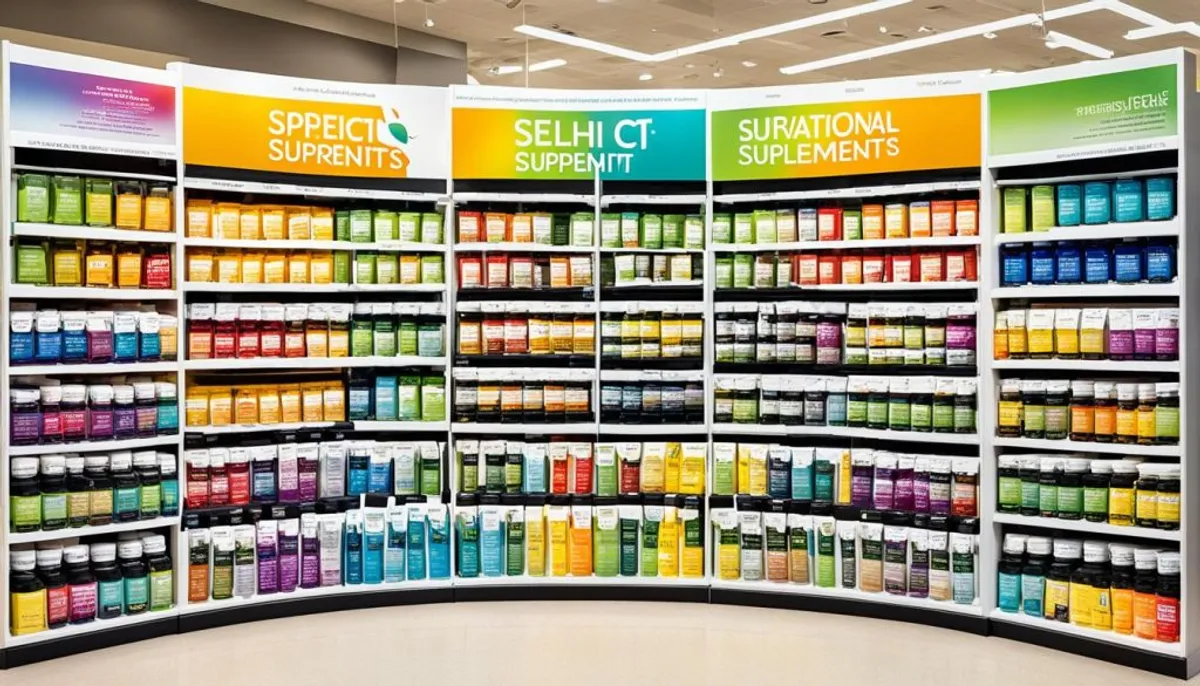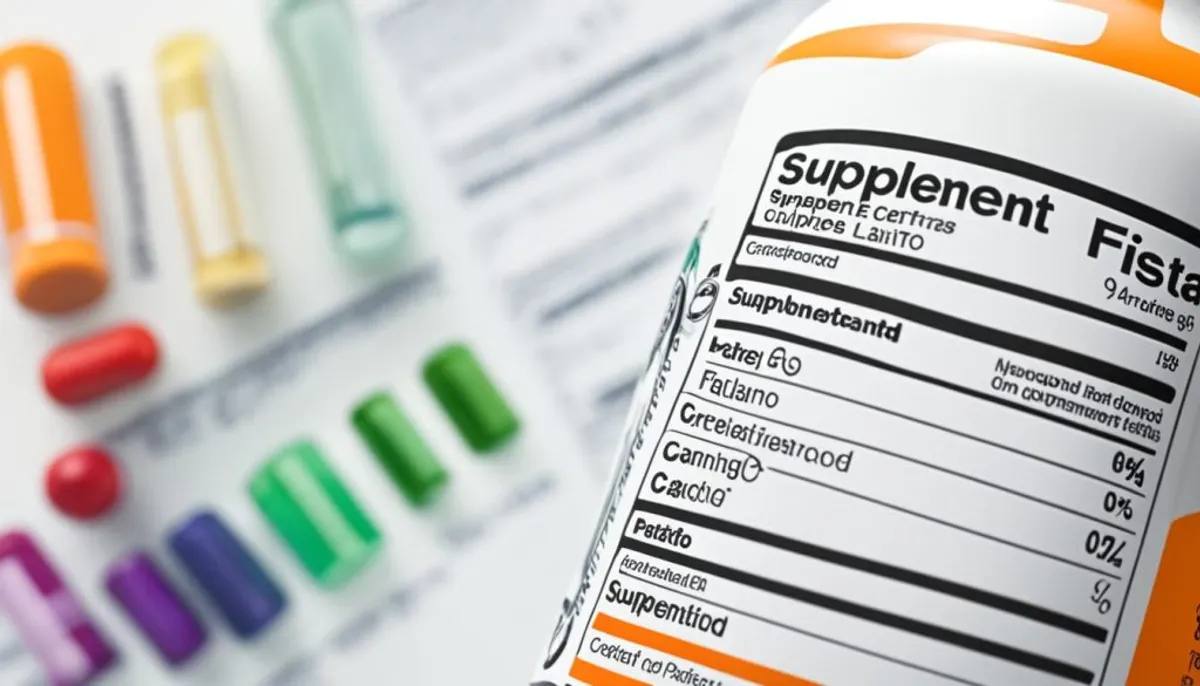The global dietary supplement market is booming, expected to hit $272.4 Billion by 2028 with an 8.6% growth rate. Brands need strong marketing strategies to stand out. With more people focusing on health, higher incomes, and more fitness fans, the market is growing fast. Proteins and amino acids are expected to grow the fastest at 13.3%.

To make the most of this trend, supplement brands should use a mix of digital marketing methods. This includes content marketing, influencer collaborations, search engine optimization (SEO), and paid advertising. Using these marketing ideas for nutritional supplements, brands can connect with their audience, gain trust, and boost sales in the health and wellness market.
Understanding the Supplement Market and Audience
The supplement industry meets the needs of many consumers. People from all walks of life look for supplements to help them. Whether it’s athletes wanting to boost their performance or seniors wanting to stay healthy, there’s a supplement for everyone.
Identifying Target Demographics
People of all ages and lifestyles use supplements. Athletes and fitness enthusiasts often use protein powders and energy boosters. Seniors might take vitamins to fill nutritional gaps and stay healthy. Vegetarians and vegans might need supplements like B12 and D because their diets lack these nutrients.
Addressing Specific Nutritional Needs and Goals
It’s important to know what different groups need from supplements. Athletes look for supplements to improve their performance. Seniors want products that help them age well. Vegetarians and vegans seek supplements to meet their dietary needs.
| Target Audience | Nutritional Needs | Health Goals |
|---|---|---|
| Athletes and Fitness Enthusiasts | Protein, Creatine, Energy Boosters | Enhanced Physical Performance |
| Seniors | Vitamins, Minerals | Maintain Overall Health and Wellness |
| Vegetarians and Vegans | B12, D, Omega-3s | Compensate for Nutrient Deficiencies |
Regulatory Compliance and Ethical Marketing
In the world of nutritional supplements, brands face many rules to follow. They must make sure their marketing is true and follows the law. The FDA regulations for supplement marketing mean labels must be honest and follow certain standards. The FTC guidelines for supplement advertising aim to stop false or misleading ads.
Putting transparency, scientific evidence, and consumer well-being first is key. It helps brands stay out of legal trouble and gain trust. Ethical marketing practices like using solid research, being clear about products, and sharing real stories help make the supplement industry better.
FDA and FTC Guidelines for Supplement Advertising
Supplement brands must follow the legal compliance in the supplement industry. The FDA says labels must be honest about what’s in the product and what it does. The FTC says no to deceptive advertising that lies about how safe or effective a product is.
- FDA rules require supplement makers to follow Good Manufacturing Practices (GMP) for quality and safety.
- The FTC watches over supplement ads to stop false or misleading claims, like big health promises or hidden risks.
- Brands that ignore these rules could face fines, legal trouble, and a bad reputation.
Building Trust and Brand Reputation through Transparency
In ethical marketing practices for supplements, being open is crucial. People want to know more about what they buy, and brands that share information build stronger bonds with customers.
- Be clear about your product, listing all ingredients, nutritional facts, and the science behind your claims.
- Use real customer stories and avoid making things sound better than they are.
- Talk openly with customers, answering their questions and concerns honestly and quickly.
By sticking to regulatory compliance and ethical marketing practices, supplement brands can be seen as leaders. They can earn the trust of customers and keep them coming back.

marketing ideas for nutritional supplements
In the world of supplement marketing, it’s important to think outside the box. Content marketing is a great way to share valuable content that draws in and keeps potential customers interested. You can write articles, show how your products work, and even share recipes that include your supplements.
Influencer marketing is also a strong strategy. By working with social media stars, you can reach people who are already interested in supplements. These influencers can help share your brand’s message and help sell your products.
Don’t forget about social media and email marketing. These tools can help spread the word about your supplements. They help build a strong connection with your customers and can increase sales for your nutritional supplement business.
Content Marketing Strategies
- Write articles and blog posts that meet your audience’s nutritional needs and goals
- Make product demos and tutorials to show how your supplements work
- Share recipes that use your supplements as main ingredients
- Make sure your content is easy to find on search engines to get more visitors
Influencer and Social Media Marketing
- Find social media stars in your supplement niche
- Work with these influencers to create sponsored content and reviews
- Use the influencer’s followers to reach more people interested in your supplements
- Be active on social media platforms like Instagram, Facebook, and YouTube
- Encourage your followers to share their own content about your brand
Using content marketing, influencer marketing, and digital tools like social media and email can help you reach and connect with your target audience. This can lead to more people buying your nutritional supplements.

| Marketing Tactic | Key Benefits | Example Tactics |
|---|---|---|
| Content Marketing |
|
|
| Influencer Marketing |
|
|
| Social Media and Email Marketing |
|
|
Leveraging Digital Marketing Channels
In the ever-changing world of supplements, smart brands use digital marketing to grow their reach. Search Engine Optimization (SEO) is key for getting more people to visit their websites. By making their product pages better and creating content that meets nutritional needs, brands can get noticed more.
Paid advertising is also a great way for supplement brands to reach people. Ads on social media and search engines can target potential customers at different stages of buying. When used with remarketing strategies, these ads can help turn leads into repeat customers and build loyalty.
Using a variety of digital marketing channels helps supplement brands connect with people in a deeper way. By improving their online presence and running targeted ads, these brands can stand out in a crowded market.
Search Engine Optimization (SEO) for Supplements
Getting your supplement brand seen in search results is key to reaching your audience. SEO for supplement websites means making product pages better, creating content that answers nutritional questions, and building a strong online brand. These SEO efforts can boost your rankings and draw in the right customers.
Paid Advertising and Remarketing
Paid advertising is another strong tool for supplement companies. Ads on social media and search engines let you target people based on what they like and buy. When you add remarketing strategies to these ads, you can keep customers coming back and build loyalty.
| Digital Marketing Channel | Key Benefits | Recommended Strategies |
|---|---|---|
| Search Engine Optimization (SEO) |
|
|
| Paid Advertising |
|
|
Conclusion
The dietary supplement industry is growing fast, offering many chances for brands to make the most of it. But, the market is very competitive. So, it’s key for supplement companies to have strong marketing plans.
Understanding who their customers are and what they need is vital. This helps brands make marketing that speaks to their audience. Following FDA and FTC rules is also important. It builds trust with customers and authorities.
Using digital marketing tools like content marketing, influencer partnerships, SEO, and paid ads can help a brand stand out. By combining these strategies well, supplement companies can stay ahead in the changing market. This way, they can grow and succeed over time.
Reduce your speed of aging, one scoop at a time with Green Zero
Green Zero is a daily core supplement for longevity inspired by the most complete longevity protocol. Bryan Johnson has spent millions of dollars to maximize his longevity. He made this shake to positively influence biological markers, from energy levels to metabolism to cellular regeneration.
RelatedRelated articles



